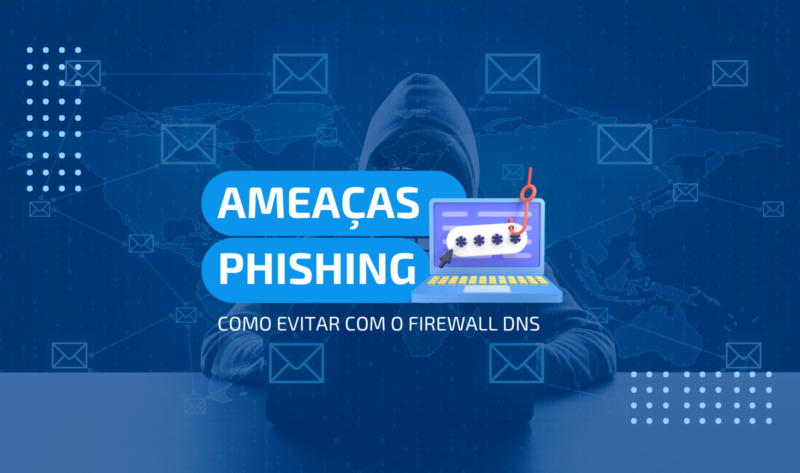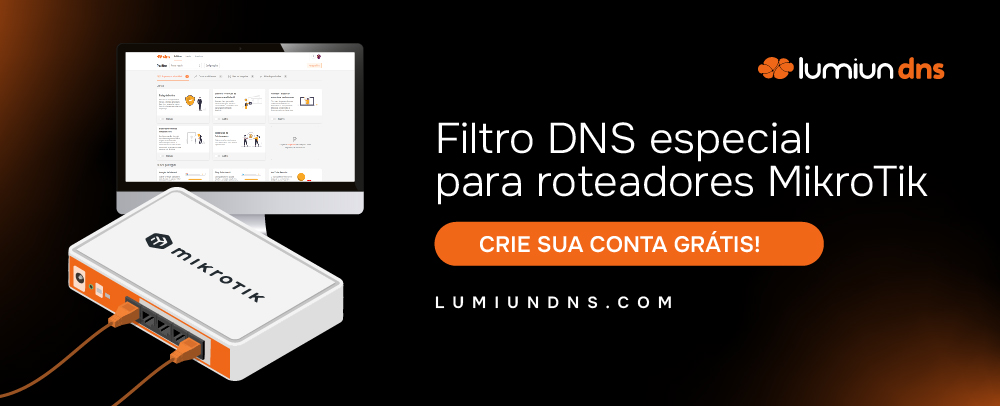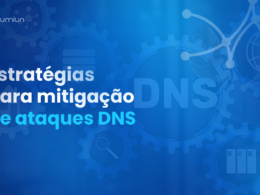Phishing is one of the oldest threats on the internet and remains one of the main security problems within this environment. Since it does not need sophisticated resources to be able to make your victims and divert information, cyber threat being fought with numerous tools, such as Firewall DNS.
This strategy does not require broad technical knowledge and can be spread through various platforms. Phishing is one of the most common cyber attacks and can cause numerous problems for companies and users . In addition to diverting sensitive information, this threat also allows the implementation of malicious files and viruses on devices, causing technical problems and unavailability in services.
Understand how phishing can hurt your business:
For this reason, it is very important for companies to prepare to deal with this threat in the best way possible , with the best tools on the market to prevent this trap from causing business problems. Here's the full content and find out how Firewall DNS can help your business ensure your digital safety.
What is phishing?
Phishing , confidential documents and even for the installation of malicious software. Using social engineering , cybercriminals develop fake emails if you are trusted companies to deceive their victims.
One of the most used strategies in the application of this scam lies in the simulation of emails from financial institutions and e-commerce , leading the user to believe that it is a legitimate contact. Usually this email comes with a malicious link that directs the victim to a fake page or causes her to download a malicious file.
Because it is a simplified strategy, Phishing is still widely used by cybercriminals to apply scams and steal sensitive information. According to the report prepared by Kaspersky , in 2022 Brazil suffered approximately 76,000 fraud attempts through phishing attacks.
This same report has brought worrying data on the distribution of malicious messages, demonstrating that cybercriminals have been using WhatsApp, Telegram and Viber to maintain an even more comprehensive false messaging strategy . This data demonstrates how phishing is still an active threat and should be fought through more efficient security strategies.
Is it possible to avoid phishing?
First, we need to understand that phishing, despite being a simplified threat, can also cause immeasurable damage to companies. Since the emergence of the General Data Protection Law , the concern with the confidentiality of confidential information has become a priority within the business.
Thus, it became necessary for companies to implement more sophisticated resources to block undue attempts. In addition to preventing users from creating vulnerability points in the company's networks and devices.
It is necessary to establish, in addition to a policy of use of the internet , the implementation of some rules of conduct that help to avoid much of malicious contacts, such as:
Stay tuned to email addresses and contacts
Although cybercriminals can create emails very similar to those used by legitimate companies, it is impossible to properly disguise sender emails and contact information. Although the threat can successfully replicate the institution's name and its visual characteristics , the sender's address does not have a real connection with the institution, being easily identified.
A valuable tip is to check the presence of a large extension at this email address containing abbreviations or numbers. It is also important to ascertain content after the arroba, ie whether it is really a corporate email or if it is a common account of an email platform that deserves even more attention.
Orthographic errors
It is very common that within phishing emails we find very evident spelling errors. Legitimate companies hardly make grammar or spelling errors, so that the presence of one can characterize an attempt to phishing .
Beware of links and files
It is very important to avoid access to emails sent by email from non-reliable sender and also with possible attachments . In addition to going through companies and financial institutions, cybercriminals can also have access to their contact list and disguise their fake emails as someone from their circle of family members, friends or co-workers.
These links can redirect to fake pages and make you provide access data or bank information , causing great damage to you and the company. Annexes can be malicious files that corrupt devices and divert information.
Phishing attacks are sophisticated
For many years, this kind of threat has appeared for the lack of knowledge and preparation of internet users. For this reason, even the most simplified attempts were able to obtain results based on the lack of preparation of the victims.
However, over the years phishing attacks have become more directed. Using Social Engineering, cybercriminals began to develop more personalized traps to reach victims and users of specific companies and organizations.
Depending on the purpose of the criminal, social networking data can be collected to build an assertive and efficient trap , creating a realistic email and directing the attack to a specific victim. Personal information is used to build this email or contact attempt, so that access to the links or downloading the attachments is more likely.
Improving cybercriminals strategy has also been favored by the emergence of new technologies, so that these threats are becoming increasingly difficult to detect , such as automation resources. As a result, cybercriminals can send millions of phishing emails simultaneously.
Use technology as an ally
In addition to implementing these care in the company's routine, it is also necessary to have technological resources that help keep the networks and devices more protected, such as Firewall DNS. Although there are anti phishing measures that help reduce the incidence of this type of attack, in most cases this strategy is insufficient.
This is because there are some problems that are easily circumvenable by cybercriminals, such as:
- Cybercriminals can easily generate new fraudulent domains, so that URLs present in the black list cannot keep up with the current threats.
- Email filtering depends on content inspection , signatures and display names.
- Even with the employee education process, it is still possible to create vulnerability points.
- Commercial email commitment filters can only be applied to email tools , disregarding the threats that can come through web pages, applications and social networks.
- Among other problems.
For this reason, Firewall DNS has been shown to be a complete and well -structured tool to detect and control phishing threats within your business. With increasingly sophisticated and structured threats, it is essential to have the correct tool to keep your business and your data always protected.
What is Firewall DNS?
Firewall DNS is a security tool that has access filters and locking systems to maintain your company's device and network protection. This feature can optimize security strategy and help block possible contamination by viruses and malware, which cause numerous damage to your company.
The web content filter is a feature used to establish assertive control of access to the company's network, blocking access to certain types of content. This tool allows managers to customize rules and restrictions according to the needs of the company.
Due to its resources, Firewall DNS configures an advance in the evolution of security processes, control and monitoring of access within companies. Unlike traditional firewall, this feature performs users' blocking and prevents the loss and leakage of data stored by the company.
Acting with the most modern tools and features today, Firewall DNS allows the isolation of devices considered compromised. With this, it ensures that the company has access to an automated threat feed, bringing valuable information about attacks and malicious access . Thus, the Firewall DNS:
- Avoid access to harmful pages;
- Block fake or malicious ads;
- Performs the block of links considered malicious;
- Prevents leakage and data theft of the company;
- Blocks the installation of unwanted software;
- And much more.
Considering that cyber threats are in a state of high effectiveness, it is very important to implement solutions and revise security actions to maintain business data protection . Firewall DNS can be a valuable ally of this strategy, building an extra layer of protection on your business networks and devices.
How does Firewall DNS work against phishing threats?
As we have seen, phishing is a threat that remains in broad growth over the years , and it is necessary to implement more assertive and complete solutions to avoid the damage caused by it. Firewall DNS acts as a complete solution that can add numerous advantages to the business:
Real -time threat blockade
This tool can identify emails and phishing sites automatically and perform the immediate lock on the company's network. This feature does not depend on a blacklist or malicious standard lists to identify and block these threats , with constant monitoring of real -time threats.
Identification of threats faster
Thanks to the continuous analysis that Firewall DNS performs on your company's devices and networks, it is possible to identify possible threats faster, preventing them from causing any kind of problem for your company. Its technology allows simultaneous identification and blocking , ensuring that possible threats cannot settle in or cause problems for your business.
Full coverage
Unlike some phishing tools on the market, Firewall DNS provides universal coverage. This means that it can identify and block email links, documents, applications, search engine results, web pages, and more, all through the web content filter.
Effectiveness
Since Firewall DNS is based on the domain name system, this tool gets higher results compared to other market solutions. Its technology avoids dropout through content changes, falsification of domain name and social engineering in a predictively .
We know that cyber threats can advance together with technological tools, and it is necessary to find increasingly modern solutions to ensure data protection within a company . Firewall DNS represents an advance in the protection mechanisms that are used today, showing an updated tool in the face of the main threats.
Combining this feature with your security strategy will make a difference in protecting your business data. Predictive solutions will help your business block threats even before they cause any impact or damage.
Use the proper solution
Given the many cyber threats surrounding the digital environment today, it is essential that companies implement more efficient solutions to keep data protected. These threats can cause immeasurable damage to business, such as unavailability of services, fines and definitive interruption of activities.
For this reason, adopting strategic solutions can make all the difference in protecting data and information stored by the company. Firewall DNS has optimized features and an intuitive platform to help your business stay away from phishing problems.











